|
 This
past year has brought to the blues world an
array of young artists keeping the blues sound
alive and relevant, even if they somewhat
stretch the boundaries of the blues (generally in a good way). But a very good album
from 2018 that I missed out on until very
recently is Peach (Tricki-Woo Records) by
the sister duo making up the group Larkin Poe. I got a
small glimpse of sisters Rebecca and Megan
Lovell when they appeared as part of the
fantastic worldwide collaboration of Robbie
Robertson's "The Weight" (check it out on
YouTube), but wasn't aware of their stellar
dark blues chops until I stumbled upon a link
for Peach. This
past year has brought to the blues world an
array of young artists keeping the blues sound
alive and relevant, even if they somewhat
stretch the boundaries of the blues (generally in a good way). But a very good album
from 2018 that I missed out on until very
recently is Peach (Tricki-Woo Records) by
the sister duo making up the group Larkin Poe. I got a
small glimpse of sisters Rebecca and Megan
Lovell when they appeared as part of the
fantastic worldwide collaboration of Robbie
Robertson's "The Weight" (check it out on
YouTube), but wasn't aware of their stellar
dark blues chops until I stumbled upon a link
for Peach.
The
Lovell women don't look like traditional blues
artists as they are often characterized by their
southern goth heritage, but their old souls give
them an innate
ability to play the darkest, deepest blues and
gospel that I've heard in a while. Rebecca
plays guitar and mandolin while handling lead
vocals when the sisters aren't harmonizing,
while Megan is an absolute monster on her 1940s
Rickenbacker lap steel guitar and occasionally
picking up the banjo.
The
music on Peach will take you to dark places of
your soul that you didn't know existed, so be
ready for the experience. Launching the album is
a very primal blues version of the Robert
Johnson classic, "Come on in My Kitchen," with
Megan laying out some impressive licks on the
lap steel. Perhaps the most impressive number
here is the very deep version of Son House's "Preachin'
Blues," backed by rhythmic percussion and
featuring Rebecca's echo-y vocals.
Heading deep into an old school gospel sound is
a version of the traditional "John the
Revelator," with more sparse instrumentation
until Rebecca rips off a monster guitar solo.
Picking up the tempo considerably is a cover of Leadbelly's "Black Betty," featuring
repetitive ,shouting vocals by the sisters.
The
Lovells can also write their own tunes, with one
of the better originals being "Cast 'Em Out," a
pleasant tune with a gospel-ish intro. It's a
good break from the more intense numbers here.
Another of their own compositions is the heavy
blues, "Pink & Red," featuring a bit of rap-style
vocals with plenty of echo.
Perhaps the best of their original songs is the
dark and heavy blues, "Freedom," with Megan
playing the banjo over some percussive sound
effects in the background.
There is plenty of wonderful music on Peach,
with my very minor complaint that with ten songs
checking in at just about half an hour I wish
that it was longer. But no problem, because I
can just hit repeat and listen to it all over
again.
In
case you were wondering, the name Larkin Poe
comes from their great-great-great grandfather,
a distant relative of famed author Edgar Allan
Poe, so the Lovells' venture to the dark side of
the blues is perhaps part of their DNA. Needless
to say, Peach comes highly recommended.
--- Bill Mitchell
 Speaking of albums from 2018 that did not
previously get reviewed, Let It Go (Ruf
Records) from Bernard Allison has been on
my pile of CDs to cover for at least a year.
Somehow it got inadvertently shuffled to the
bottom of the stack, which is a shame because
it's a mighty fine collection of a dozen high
quality blues cuts. Speaking of albums from 2018 that did not
previously get reviewed, Let It Go (Ruf
Records) from Bernard Allison has been on
my pile of CDs to cover for at least a year.
Somehow it got inadvertently shuffled to the
bottom of the stack, which is a shame because
it's a mighty fine collection of a dozen high
quality blues cuts.
Of
course, Allison is a fine artist in his own
right, but there's a lot of his late father,
Luther, in his music --- and that's a good
thing! Produced by Jim Gaines, Let It Go
has Allison appearing with his three regular
band mates (John T. McGhee - rhythm guitar,
George Moye - bass, Mario Dawson - drums).
Better late than never, here's what I like about
Let It Go.
"Backdoor Man" has Allison sounding a little
like Johnny Guitar Watson with his vocals, while
he also contributes a really find slide solo and
plays B3. "Blues Party" is another Allison
original on which he opens this up-tempo shuffle
with an Elmore James-style blues guitar solo
before going on to mention a lot of blues
artists from the past that are attending this
particular blues party. "Same Ole Feeling" gets
soulful and funky before Allison lays down some
nice bluesy and jazzy guitar.
Among the four cover tunes on Let It Go,
Allison does a version of the Brook Benton
classic, "Kiddio," bringing in guest sax player
Jose Ned James to flesh out the band. "Look Out Mabel" is an up-tempo 12-bar
blues written by Melvin London & G.L. Crockett
and recorded by the latter in 1958 on the
Checker label, highlighted by some nice staccato
guitar chords from Allison.
Most
of the songs are original compositions, but one
of my favorites from the CD was written by
Allison's father. "You're Gonna Need Me"
is a slow blues, more subdued than the
original, with nice subtle blues guitar.
I
admit that I haven't dug as deeply into the
Bernard Allison discography as I should have by
now, and I get the feeling that Let It Go
is a nice stepping stone to the rest of the
man's library.
--- Bill Mitchell
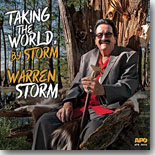 Warren Storm is truly one of the pioneers
of swamp pop music, that amalgamation of
Louisiana Cajun, country & western and rhythm &
blues that came out of Louisiana and east Texas during the '50s
and '60s. Doubling as both a drummer and singer
in his youth, Storm first recorded the single
"Prisoner's Song" / "Mama Mama Mama (Look What
Your Little Boy's Done)" for the Nasco label,
with both songs hitting the Billboard Hot
100. When musician / educator / writer Yvette
Landry started working on a book about Storm's
career, it was obvious that she also needed to
take this legend into the studio. The result is
Taking The World By Storm (APO Records),
a collection of 11 new recordings by Storm and
lots of special guests, produced by Ms. Landry. Warren Storm is truly one of the pioneers
of swamp pop music, that amalgamation of
Louisiana Cajun, country & western and rhythm &
blues that came out of Louisiana and east Texas during the '50s
and '60s. Doubling as both a drummer and singer
in his youth, Storm first recorded the single
"Prisoner's Song" / "Mama Mama Mama (Look What
Your Little Boy's Done)" for the Nasco label,
with both songs hitting the Billboard Hot
100. When musician / educator / writer Yvette
Landry started working on a book about Storm's
career, it was obvious that she also needed to
take this legend into the studio. The result is
Taking The World By Storm (APO Records),
a collection of 11 new recordings by Storm and
lots of special guests, produced by Ms. Landry.
Now
82, Storm's vocals aren't as powerful as in the
past but he's still got a voice capable of
handling the material here. The backing band on
all cuts include Eric Adcock (piano), Roddie
Romero (guitar), Derek Huston (sax), Chris
French (upright bass) and Gary Usie (drums).
The
album opens with a version of John Fogerty's
"Long as I Can See the Light," with Fogerty
himself helping with vocals while Huston comes
in with a nice sax solo. Next up is a cover of
one of the best-known swamp pop hits, "Mathilda,"
done in 1963 by Cookie & The Cupcakes. It's
engineered to have a more vintage sound, and
includes guests Marc Broussard on co-vocals and
the always interesting Sonny Landreth on slide
guitar.
Another highlight of the album is the Slim Harpo
swamp blues classic, "Raining in My Heart,"
staying close to the original while Storm
shows off some of his best vocal work, Adcock adds
the appropriate Louisiana-style piano and Romero
contributes tasteful guitar accompaniment.
Both
of Storm's early hits, "Prisoner's Song" and
"Mama, Mama, Mama," are reprised here, the
latter being an up-tempo stomper with more hot
sax from Huston and co-vocals from Landry.
"Tennessee Blues," written by another swamp pop
pioneer, Bobby Charles, gets a country workup
with the addition of Richard Comeaux on pedal
steel and Beau Thomas on fiddle. Still another
swamp pop legend, Willie "Tee" Trahan, guest
stars on tenor sax on the very New Orleans-ish,
"In My Moments of Sorrow," and the JD Miller
composition, "Troubles, Troubles."
Thanks to Yvette Landry for making sure that
Storm's story is being told, both in the book as well as this fine CD,
Taking The World By Storm.
as well as this fine CD,
Taking The World By Storm.
--- Bill Mitchell
 Released independently by Blank Studios, the
word at the end of the song title, “I’d Give It
All – Redux,” indicates this is a revival of a
ballad from the gypsy-folk and rock band Holy Moly & The Crackers’ best selling
Take A Bite
album. However, it is much more than that
because “I’d Give It All” marks the debut solo
single release of Holy Moly & The Crackers’
charismatic front woman, lead vocalist and
violinist Ruth Patterson. Released independently by Blank Studios, the
word at the end of the song title, “I’d Give It
All – Redux,” indicates this is a revival of a
ballad from the gypsy-folk and rock band Holy Moly & The Crackers’ best selling
Take A Bite
album. However, it is much more than that
because “I’d Give It All” marks the debut solo
single release of Holy Moly & The Crackers’
charismatic front woman, lead vocalist and
violinist Ruth Patterson.
Anyone witnessing the
band’s raucous live performances will confirm
the power and sincerity of Ruth’s solo vocal
interlude with piano accompaniment as she bares
her soul with amazing courage, conviction and
just a hint of vulnerability. This vibe shines
throughout the song which whilst only lasting
four minutes encapsulates emotions so deep they
become embedded in the listener’s heart. Only
Beth Hart comes anywhere near the UK-based
chanteuse in terms of songwriting acumen, vocal
intensity and keyboard skills.
In the same way that
Little Girl Blue launched
the career of American legend Nina Simone over
60 years ago, Ruth’s inspirational composition
has the power to do the same for her. Other
similarities include both women being gifted
songwriters, arrangers and instrumentalists who
initially aspired to be classical musicians and
whose music spans a broad range of styles
including folk, jazz, blues and pop.
This beautifully crafted love song opens with
attitude rather than sentimentality, the
emphatic piano chords a precursor to what Ruth
doesn’t want. Not for her “the dozen red rose
roses laid at my front door” or the fine wine
and dining which “sticks in my throat,” and when
it comes to diamonds, “well it might as well be
coal.” The strong poetic lyricism of this song
is emphasized in the next observation: “And
though I know it’s all to please me but the
perfume stings. My eyes are not adjusting to the
bright lights.”
The jazz-inflected vocals and carefully
orchestrated atmospheric background string
quartet set the scene perfectly for the killer
line, “You’ve missed the point babe: love is
always silent.” It is at this point that the
chorus takes the words and meaning into another
stratosphere as Patterson knows what she needs
and is going to take her time to find it.
The
sumptuous strings and Ruth’s mellifluous backing
vocals merge in a series of soaring, subtly
layered crescendos as the quest to discover the
right kind of love, keeping it and never letting
go reaches its climax. “And when I find what I'm
looking for I'm gonna run, run, run, run, run
away with you.” Rarely has a single piece of
music left the listener feel so energized,
empowered and exhilarated.
“I’d Give It All” is available on most music
streaming platforms, and is best listened to in
conjunction with the surreal, evocative music
video by renowned film director, artist and
activist Antonia Luxem and cinematographer Tegid
Cartwright on this
YouTube video. The
film complements perfectly the flow and emotion
of the music. The underwater scenes are
literally breathtaking with the ‘mermaid’ who is
unable to walk on land moving confidently,
effortlessly and gracefully in a mesmerizing
aquatic scene.
--- Dave Scott
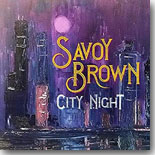 Like the Mississippi River,
Savoy Brown rolls on
and on. City Night (Quarto Valley Records) is
the band’s 40th release over their 50+ years of
existence. Guitarist Kim Simmonds has been there
since the beginning, and based on the contents
of the latest effort he ain’t going anywhere
anytime soon. The band continues to be
structured as a trio, with Simmonds handling
guitar and vocals, backed by bassist Pat DeSalvo
and drummer Garrett Grimm. Simmonds wrote all
12 tracks and his guitar work is up to his
usual high standards. Vocally, he has an
understated but effective delivery similar to
Lou Reed’s style. Like the Mississippi River,
Savoy Brown rolls on
and on. City Night (Quarto Valley Records) is
the band’s 40th release over their 50+ years of
existence. Guitarist Kim Simmonds has been there
since the beginning, and based on the contents
of the latest effort he ain’t going anywhere
anytime soon. The band continues to be
structured as a trio, with Simmonds handling
guitar and vocals, backed by bassist Pat DeSalvo
and drummer Garrett Grimm. Simmonds wrote all
12 tracks and his guitar work is up to his
usual high standards. Vocally, he has an
understated but effective delivery similar to
Lou Reed’s style.
The opener, “Walking On Hot Stones” is a blues
rocker with a chugging rhythm and screaming
slide guitar runs, “Don’t Hang Me Out To Dry” is
a roadhouse raver with a touch of Texas
highlighted by Simmond’s crunchy guitar work,
and “Payback Time” adds a little funk into the
rhythm for a cool change of pace, while “Red
Light Mama” sounds like an early Savoy Brown
track (Simmonds’ slide guitar is particularly
fierce on this track). The hypnotic “Conjure
Rhythm” has a steamy, swampy feel, and
“Neighborhood Blues” is a fine shot of
contemporary blues.
“Selfish World” slows things down a bit at the
midpoint of the album, with Simmonds at the top
of his game with some of his best guitar work.
“Wearing Thin” picks up the pace with a
rock-steady mid-tempo groove, and the title
track is a gritty shuffle loaded with moody
atmosphere and excellent solo work from Simmonds.
The Bo Diddley-on-steroids “Hang In Tough” rocks
as hard as anything on the album, featuring more
sensational slide, and “Superstitious Woman” is
a modern blues that touches on the delta and the
swamp. The album closes as strongly as it
started with “Ain’t Gonna Worry,” a prototypical
boogie blues rocker.
Kim Simmonds says that after 50+ years in the
business he’s not going anywhere, which is good
news for blues rock fans and Savoy Brown fans.
--- Graham Clarke
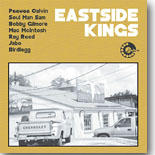 Thank goodness for Eddie Stout and Dialtone
Records. For 20 years, Stout has been doing his
part to keep the blues alive in Austin and to
keep the numerous underappreciated and
underrecorded indigenous blues artists on the
musical map. Stout’s Dialtone label is
chock-full of excellent releases, one of their
most recent of which is Eastside Kings, a
superb collection of recordings from some of the
fine musicians based on the east side of Austin,
a section of town just a mile from the downtown
area that was once covered with houses, small
businesses, bars, and other music venues that’s
now being leveled and replaced with condos and
coffee shops. Thank goodness for Eddie Stout and Dialtone
Records. For 20 years, Stout has been doing his
part to keep the blues alive in Austin and to
keep the numerous underappreciated and
underrecorded indigenous blues artists on the
musical map. Stout’s Dialtone label is
chock-full of excellent releases, one of their
most recent of which is Eastside Kings, a
superb collection of recordings from some of the
fine musicians based on the east side of Austin,
a section of town just a mile from the downtown
area that was once covered with houses, small
businesses, bars, and other music venues that’s
now being leveled and replaced with condos and
coffee shops.
The Kings include Dialtone recording artist
Birdlegg, who sings and plays harp on the romp
“Evil In The Morning,” singer Mac McIntosh, who
puts his big, booming voice to good use on the
swing classic “Kidney Stew Is Fine” and the slow
blues “Whiskey Drinking Woman.” Guitarist Bobby
Gilmore, who backed Dallas blues legends Robert
Ealey and U.P. Wilson, struts his stuff on the
Windy City-styled shuffle “Tore Up From The
Floor Up,” and bass player James “Jabo” Houston
sings his own easygoing “First Name Is Jabo.”
Ray Reed shines on two numbers, the energetic
shuffle “”Whisper In Your Ear” and the
marvelously low-key “Boogie Chillen” cover that
closes the track with Reed’s growling vocal only
backed by guitar. Keyboardist Peewee Calvin’s
two songs include the funky and fun “Goodlie
Ooglie,” and the urban soul life lesson “Untold
Story.” Soul Man Sam (Evans) keeps things on the
soul-blues side with two tracks, his grainy
vocals doing the job on the opener “Let The Good
Times Roll” and going silky smooth on Solomon
Burke’s hit “Cry To Me.”
The Kings themselves do a fine job throughout,
but the veteran band backing them (Stout – bass,
Stevie Fulton – guitar/percussion, Kaz Kazanoff
– horns, Nick Connolly – piano, Nico Leophonte
and Charles Shaw – drums) get their moment in
the spotlight as well with two excellent
instrumentals. The first, “Stevie C,” has a
funky rhythm that brings to mind the Meters’
heyday, and the second, “Skirt Chaser,” is a
cool blues shuffle.
This disc came out in 2017 and if you missed it
the first time around, and you are a fan of
gritty blues and soul like they do in Texas, you
must have this in your collection. Hats off to
Stout for continuing to help keep this music
alive, and for his continued efforts in bringing
it to a wider audience via Dialtone and Austin’s
annual Eastside Kings Blues Festival.
--- Graham Clarke
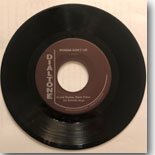 A couple of months ago, Blues Bytes reviewed the
recent Vizztone album from Bloodest Saxophone
featuring the Texas Blues Ladies. Dialtone
Records recently issued a 45 from the band
featuring vocalist Crystal Thomas. The A-side is
the sensually soulful “Your Eyes,” featuring Thomas’ smoothly caressing vocal backed
by the band’s superlative horn section. It’s a
track that you wish would continue at least
twice as long as it does. The B-side is “The
Grapevine,” a wild swinging boogie track that
appeared on their recent album and features
Lauren Cervantes and Angela Miller that will get
dancers on their feet. If jump blues and boogie
is your bag, this is a nice addition to your
collection. A couple of months ago, Blues Bytes reviewed the
recent Vizztone album from Bloodest Saxophone
featuring the Texas Blues Ladies. Dialtone
Records recently issued a 45 from the band
featuring vocalist Crystal Thomas. The A-side is
the sensually soulful “Your Eyes,” featuring Thomas’ smoothly caressing vocal backed
by the band’s superlative horn section. It’s a
track that you wish would continue at least
twice as long as it does. The B-side is “The
Grapevine,” a wild swinging boogie track that
appeared on their recent album and features
Lauren Cervantes and Angela Miller that will get
dancers on their feet. If jump blues and boogie
is your bag, this is a nice addition to your
collection.
Recently, Dialtone also released a 45 for
Ms. Thomas in advance of an upcoming album
release from the singer in early 2020. If what
we hear from “Woman Don’t Lie” / “They Call Me
Crystal” is any indication of what to expect
from the future album, Ms. Thomas is going to
have a very fine year in 2020. She’s backed by
the Eastside Kings Band (Eddie Stout – bass,
Stevie Fulton – guitar, Nick Connolly – bass),
with Jason Moeller manning the drum kit. “Woman
Don’t Lie” is funky mid-tempo R&B with Thomas
and Fulton splitting the vocal duties, while
“They Call Me Crystal” is a sassy slow blues.
Both tracks bode well for Thomas and Dialtone
Records, a label that never disappoints those
blues fans who know about it.
--- Graham Clarke
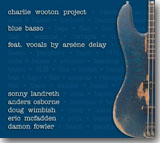 Blues fans may recognize Charlie Wooton as the
bass player for the supergroups Royal Southern
Brotherhood, The New Orleans Suspects, or
Zydefunk. The New Orleans bassist recently
assembled a talented group, dubbed The Charlie Wooton Project, releasing
Blue Basso (Wild Heart
Records). The album is a tribute to the late Jaco Pastorious, one of the most influential
electric bassists of all time who delved into
fusion, funk, blues, and R&B during his
sadly-abbreviated career. Wooton is a kindred
spirit to Pastorious in that he’s a technical
marvel on his instrument and is also constantly
looking for new musical directions to pursue. Blues fans may recognize Charlie Wooton as the
bass player for the supergroups Royal Southern
Brotherhood, The New Orleans Suspects, or
Zydefunk. The New Orleans bassist recently
assembled a talented group, dubbed The Charlie Wooton Project, releasing
Blue Basso (Wild Heart
Records). The album is a tribute to the late Jaco Pastorious, one of the most influential
electric bassists of all time who delved into
fusion, funk, blues, and R&B during his
sadly-abbreviated career. Wooton is a kindred
spirit to Pastorious in that he’s a technical
marvel on his instrument and is also constantly
looking for new musical directions to pursue.
The Project includes Wooton (bass), Daniel
Groover (guitar), Jermal Watson (drums), Keiko
Komaki (keys), and prominently features the
stunning vocalist Arséne Delay, along with
bassist Doug Wimbush and guitarists Sonny
Landreth, Anders Osborne, Eric McFadden, and
Damon Fowler. The 10-song set list includes
several instrumentals among the eight originals
and two covers.
Wooton teams up with Wimbush for the opening
instrumental, “Jaceaux,” a monster funk dual
bass guitar tribute to Pastorious that sets the
bar pretty high for the rest of the album, but
Wooton and company are more than up to the task.
“Reflections” and “I Didn’t Know” are R&B tunes
that features Delay’s amazing vocals with prime
guitar work from Groover on the former, and
Fowler (on lap steel) for the latter, while on
Pastorious’ “Come On Come Over,” Wooton’s bass
takes the lead with Delay vocalizing in support.
The fusion instrumental “Dimenote” features
sparkling interplay between Wooton, Groover, and
Watson. Osborne plays guitar on the soft ballad
“One Night,” another vocal showcase for Delay,
and the smoking seven-minute instrumental
“Fulton Alley” is another funk-fusion workout
that could have gone on for another seven
minutes with no problem whatsoever. Landreth
appears on two tracks, the most blues-oriented
of the set features his superb slide work kicking off the
funky rhumba, “Tell Me A Story,” as well as the acoustic
“Front Porch” where he plays resonator with Groover on guitar.
The album closes with a cover of the Rolling
Stones’ “Miss You,” but Wooton’s arrangement
sounds a lot like a version I heard on one of
Sugar Blue’s 9’0s Alligator releases, much
livelier and funkier than the original. McFadden
guests on guitar for this track and does a
marvelous job, as does Delay on vocals.
Blue Basso covers a wide range of genres --- funk,
fusion, R&B, and even the blues. But like
Charlie Wooton (and Jaco Pastorious) the music
keeps a firm footing in blues and jazz at all
times. Granted, it’s not all blues, but blues
fans will certainly find a lot to enjoy here
with the excellent musicianship and the vocals
of Arséne Delay.
--- Graham Clarke
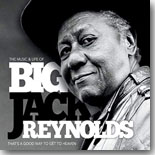 Many newer blues fans may not be familiar with
the music of Big Jack Reynolds. Actually,
many older fans may not be familiar either. I
remember reading about him. Around the
time I started listening to the blues, he
released an album with Art and Roman Griswold on
the Blue Suit label that received a lot of
attention from music critics at the time. I was
never able to track down a copy of that
one. Still haven’t, to be honest. I did remember
reading an article about Reynolds in Living
Blues and then reading his obituary when he
passed away in late 1993. Many newer blues fans may not be familiar with
the music of Big Jack Reynolds. Actually,
many older fans may not be familiar either. I
remember reading about him. Around the
time I started listening to the blues, he
released an album with Art and Roman Griswold on
the Blue Suit label that received a lot of
attention from music critics at the time. I was
never able to track down a copy of that
one. Still haven’t, to be honest. I did remember
reading an article about Reynolds in Living
Blues and then reading his obituary when he
passed away in late 1993.
Reynolds was born in the early
’20s in Albany,
Georgia, where he learned to sing and play the
blues, and traveled with his family visiting
relatives in Ohio and Michigan. He eventually
settled in Detroit after serving in the army
during World War II, and he became an in-demand
musician because of his ability to play the
harmonica, guitar, piano, and drums. He was able
to record while in Detroit with limited success
until relocating to Toledo in the late ’60s,
where he worked steadily but never recorded
again until the ’87 album with the Griswolds.
On the Blue Suit album, Reynolds and the
Griswolds were backed by a local band called The
Haircuts (Larry Gold – guitar, John Newmark –
bass/vocals, Blue Suit co-founder John Rockwood
– harmonica/vocals, Marc Gray – percussion, Tim
Gahagan – drums, Chad Smith – keyboards), who
later backed Reynolds on a few 45s and
subsequent cassette for Highball Records
shortly before Reynolds’ death.
Over the years, Reynolds became a legend on the
Toledo scene, revered so much by the local fans
and musicians that Gold and blues fan and Third
Street Cigar Records owner John Henry have
compiled a two-disc (one CD, one DVD) set
honoring the blues man, That’s A Good Way To Get
To Heaven. The first disc includes 20 of
Reynolds’ recordings, a dozen coming from his
Highball recordings where he’s backed by The
Haircuts, plus three from the session that were
never released.
The Highball tracks include covers of tunes from
Jimmy Reed, Slim Harpo, Sonny Boy Williamson II,
Little Walter, and B.B. King, so listeners new
to Reynolds will get an idea of his influences.
His own compositions reflect these influences as
well. Also included are three tracks from a 1963
session for Fortune/Hi-Q Records (“In My Room,”
“I Had A Little Dog”, and “You Don’t Treat Me
Right”) with another song (“Going Down Slow”)
released a few years later on a Detroit Blues
anthology, one side of a 45 recorded for MAH
Records in 1963 (“Made It Up In Your Mind”), and
a solo harmonica track (“She Must Be A
Millionaire”) from his Blue Suit release. This
disc gives listeners nearly all of Reynolds’
recorded work and paints a vivid picture of the
talents of this traditional blues musician.
The DVD features a movie describing Reynolds’
life and music, with interviews from Gold,
Newmark, Rockwood, Henry, Eddie Shaw, and
Harmonica Shah, among others, including a few
offerings from Reynolds himself. There are some
great stories told about Reynolds that describe
his generosity, as well as occasional cantankerousness
and even chicanery to other artists. However,
it’s obvious from all the participants that there
was much respect and love for Reynolds, the
artist and the individual. Also featured on the
DVD are a pair of performances with Reynolds and
The Haircuts taken from a local TV show, plus a
16-minute interview conducted before
Rockwood's TV performance on which Art
Griswold makes a brief appearance.
For fans of old-school blues and blues artists,
That’s A Good Way To Get To Heaven is a treasure
trove of material about an artist who didn’t get
the recognition that he deserved during his
lifetime. Kudos to Third Street Cigar Records
and The Haircuts and all others involved in
assembling this fine tribute.
--- Graham Clarke
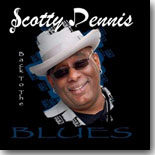 Scotty Dennis has been addicted to the blues
since the age of four when his uncle would sneak
him into Kansas City blues clubs to hear the
music, telling the club owner he was a midget!
He learned to sing from his mother and has been
singing in the church all of his life. Starting
his professional career as a backup singer, he
eventually joined the All Nighters, who later
changed their name to Scotty and the Soul Tones
and released several albums including
I’ll Be Waiting, which went to #3 on the blues
charts. After 20 years with the Soul Tones,
Dennis has embarked on a solo career with his
new album, Back To The Blues. Scotty Dennis has been addicted to the blues
since the age of four when his uncle would sneak
him into Kansas City blues clubs to hear the
music, telling the club owner he was a midget!
He learned to sing from his mother and has been
singing in the church all of his life. Starting
his professional career as a backup singer, he
eventually joined the All Nighters, who later
changed their name to Scotty and the Soul Tones
and released several albums including
I’ll Be Waiting, which went to #3 on the blues
charts. After 20 years with the Soul Tones,
Dennis has embarked on a solo career with his
new album, Back To The Blues.
Dennis wrote the lyrics on all but one of the
12 tracks, and vocally he’s pretty adept at
not just the blues, but also soul, R&B, rock, and
even pop, as evidenced by this diverse set. The
opener, “I’m Gone,” is a driving rocker, and the
mid-tempo “How Can You Love Someone” meshes funk
and R&B, while the title track is a solid blues
ballad. “Feel My Love” is a slow burner with a
pop feel, and the upbeat “It Don’t Cost You
Nothing” is a light-hearted romp.
“For Her Love” is modern Malaco-styled
soul-blues with fiery fretwork from guitarist
Brandon Hudspeth. “It’s Crying Time” is a fine
blues ballad with a soulful vocal from Dennis
and excellent guitar “response” from Hudspeth.
Anthony Gomes’ “Darkest Before The Dawn” is a
pop-based R&B ballad, but the roadhouse rocker
“I’ve Got The Blues For You” picks up the pace
considerably before settling back in with
another ballad, “You Got To Love Me.” The album
closes with a pair of energetic blues rockers,
“When I First Met The Blues” and “Play Some
Blues.”
Dennis has a smooth, but well-seasoned voice and
handles the ballads and rockers most
effectively. The band provides excellent
backing, equally efficient whether playing
blues, rock, R&B, or soul. Back To The Blues is
a most impressive solo debut for Scotty Dennis
and should satisfy anyone who digs contemporary
blues.
--- Graham Clarke
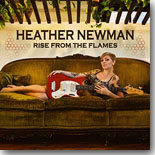 Heather Newman’s latest release,
Rise From The
Flames (Vizztone), will certainly satisfy those
who enjoyed her Vizztone debut, Burn Me Alive,
which earned the singer/bassist two Blues Blast
Awards in 2018 (for Best New Artist Debut Album
and the Sean Costello Rising Star Award) and a
Best Emerging Artist nomination in the 2019
Blues Music Awards. As with her previous
release, Rise From The Flames finds Newman
mixing her brand of blues with a little rock,
funk, and soul. She also wrote all of the songs,
13 in all, and is ably backed by guitarist
Keith Ladd, keyboardist/percussionist Ryan
Matthew, and drummer Adam Watson. Heather Newman’s latest release,
Rise From The
Flames (Vizztone), will certainly satisfy those
who enjoyed her Vizztone debut, Burn Me Alive,
which earned the singer/bassist two Blues Blast
Awards in 2018 (for Best New Artist Debut Album
and the Sean Costello Rising Star Award) and a
Best Emerging Artist nomination in the 2019
Blues Music Awards. As with her previous
release, Rise From The Flames finds Newman
mixing her brand of blues with a little rock,
funk, and soul. She also wrote all of the songs,
13 in all, and is ably backed by guitarist
Keith Ladd, keyboardist/percussionist Ryan
Matthew, and drummer Adam Watson.
The opener, “I’m Coming For You,” is a soul
burner with a smoky vocal and driving bass line
from Newman, while “Zakary” adds horns (Michael
Lefever – sax, Teddy Krulewich – trumpet) and a
funky, syncopated beat for a cool R&B feel.
“She Sure Looks Like Me” is a sassy slow blues
shuffle. Meanwhile, the smooth “You Mean To Tell
Me” mixes blues and jazz quite effectively, and
the title track is a Texas-fueled ballad with a
crisp guitar solo from Ladd.
“Water and Wine” is a sultry slow blues with a
strong vocal from Newman, and “Lonely on Beale”
is a sad tale of heartbreak that takes place in
the Bluff City. “His Soul” is a blues rock
ballad and Newman picks up acoustic guitar and
gives a heartfelt vocal performance for the
poppish “Taking It Slow.” The horns return to
kick things up a notch on the funky “Coming
Home” and the punchy “Cheapshot, while “What
Goes Around” is a mellow soulful number with a
Latin rhythm. The album closer, “That’s All,” is
a fine ballad with an excellent vocal from
Newman that cuts down deep.
Heather Newman’s
Burn Me Alive was a great release, but to
these ears Rising From The
Flames is even better. She’s a top notch
vocalist and songwriter, and she plays a pretty
mean bass, too. Keep your eyes and ears out for
this rising star on the blues scene.
--- Graham Clarke
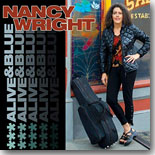 I first heard
Nancy Wright during her stint as
saxophonist for The Frank Bey / Anthony Paule
Band, but she’s been one of the most in-demand
sax players on not just the blues scene but
also the Americana and R&B scenes. Her fourth
solo release, and second for Vizztone, is Alive
& Blue, recorded live at The Saloon, San
Francisco oldest blues club, with her own Rhythm
and Roots Band (Paul Revelli – drums, Tony
Lufrano – keys/backing vocals, Jeff Tamelier –
guitar/backing vocals, Karl Severeid – bass).
The set was recorded by Greaseland Studio’s
Robby Yamilov and mixed by Kid Andersen,
featuring a dozen tracks, five originals and
seven covers. I first heard
Nancy Wright during her stint as
saxophonist for The Frank Bey / Anthony Paule
Band, but she’s been one of the most in-demand
sax players on not just the blues scene but
also the Americana and R&B scenes. Her fourth
solo release, and second for Vizztone, is Alive
& Blue, recorded live at The Saloon, San
Francisco oldest blues club, with her own Rhythm
and Roots Band (Paul Revelli – drums, Tony
Lufrano – keys/backing vocals, Jeff Tamelier –
guitar/backing vocals, Karl Severeid – bass).
The set was recorded by Greaseland Studio’s
Robby Yamilov and mixed by Kid Andersen,
featuring a dozen tracks, five originals and
seven covers.
Four of the five originals from Wright are
instrumentals, including the funky opener “Bugalu,”
where the band really gets an opportunity to
shine, particularly Wright and keyboardist
Lufrano. The soul-jazz “Jo-Jo” sounds like an
old Jimmy Smith track from the ’60s with Lufrano
complementing Wright beautifully. “Bernie’s
Blues” is a splendid slow burner that gives
guitarist Tamelier the spotlight, and the
swinging, shuffling “Rutabagas” closes out the
disc. Wright also offers a glorious cover of
King Curtis’ masterpiece “Soul Serenade.”
Vocally, Wright sounds right at home on covers
from old friend/mentor Lonnie Mack (“Been
Waiting That Long”), Don Robey (“I Don’t Want No
Man” a.k.a. “I Don’t Want No Woman” via Bobby
“Blue” Bland), “In Between Tears” (from the Irma
Thomas’ catalog), Jay Miller via Lazy Lester
(“Sugar Coated Love”), Jay McShann (a rollicking
“Keep Your Hands Off Him”), and a soulful take
on Allen Toussaint’s “What Do You Want The Girl
To Do.” She also sings her own “Warranty,” a
smooth after-hours ballad.
One listen to
Alive & Blue easily explains why
Nancy Wright is one of the most sought-after sax
players on the planet, but she’s a dynamite
vocalist and bandleader as well and the Rhythm and
Roots Band really cooks in support. Blues fans
are advised to check out this superb release.
--- Graham Clarke
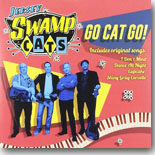 Jersey Swamp Cats (Gerry Gladston –
vocals/piano, Don Leich – vocals/guitar, Larry
Ghiorsi – vocals/bass, Chris Reardon –
vocals/drums) are based in northern New Jersey,
specializing in blues, New Orleans R&B,
rockabilly, old school rock n’ roll, and jump
blues. As you might imagine, the combination is
an energetic and entertaining mix, best experienced by checking out their latest
release, Go Cat Go! Jersey Swamp Cats (Gerry Gladston –
vocals/piano, Don Leich – vocals/guitar, Larry
Ghiorsi – vocals/bass, Chris Reardon –
vocals/drums) are based in northern New Jersey,
specializing in blues, New Orleans R&B,
rockabilly, old school rock n’ roll, and jump
blues. As you might imagine, the combination is
an energetic and entertaining mix, best experienced by checking out their latest
release, Go Cat Go!
The album consists of four originals with five
tasty covers, beginning with a lively version of
Louis Prima’s “Jump, Jive And Wail.” The band
also covers Fats Domino’s classic “Blue Monday”
in swinging fashion, and deliver a rockin' take
on Johnny “Guitar” Watson’s “Too Tired.” There’s
also a rousing remake of the traditional Cajun
number, “Tootie Ma Is A Big Fine Thing,” and a
rock-solid redo of Albert King’s “I Get Evil,”
with crisp King-like guitar from Leich.
The originals are equally strong.
The Windy
City-flavored shuffle, “Cupcake!,” really cooks,
and the Crescent City groover “I Don’t Mind”
really swings with support from guests Anthony
Salimbene, Jr. (tenor sax) and Patrick Dudasik
(trumpet). Meanwhile, “Dance All Night” is blues
with a touch of jazz, and the hard rocking
closer, “Shiny Gray Corvette,” ends the album on
as high a note as it started.
Go Cat Go! is all killer, no filler. The only
downside is that there’s not enough of it,
clocking in at just south of 29 minutes. That’s
okay though, because you can just start over and
enjoy it all over again.
--- Graham Clarke
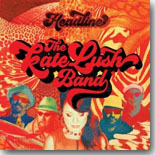 I’ve come to figure out that they really know a
thing or two about playing blues and soul in
Australia. Some of the best new blues and soul
music I’ve heard in recent years has come from
the land down under. The Kate Lush Band is the
latest addition to my catalog of Australian acts
that deserve to be heard by a wider audience.
Ms. Lush and the band have enjoyed much success
in their native country and in Europe in recent
years, and their latest release, Headline, should
earn the band a few worldwide. I’ve come to figure out that they really know a
thing or two about playing blues and soul in
Australia. Some of the best new blues and soul
music I’ve heard in recent years has come from
the land down under. The Kate Lush Band is the
latest addition to my catalog of Australian acts
that deserve to be heard by a wider audience.
Ms. Lush and the band have enjoyed much success
in their native country and in Europe in recent
years, and their latest release, Headline, should
earn the band a few worldwide.
Headline includes
11 tracks, all written by
Lush and the band, which also includes guitarist
Matt Roberts, bassist Tim Wilson, drummer Tony
Boyd, keyboardist Wes Harder, with horns from
Jason Bruer (sax), Mike Raper (trombone), and
Adrian Veale (trumpet) on selected tracks and
the amazing Dave Hole guesting on two numbers.
The band’s brand of blues is a spirited one,
incorporating plenty of soul, R&B, and funk.
The title track opens the disc, one of four
tracks with horns. It has a light R&B feel and
Lush’s vocal is marvelous. The funky “If You
Don’t Like It” has a bit of a New Orleans flair
with a rock edge. Slide guitarist extraordinaire
Hole makes his first appearance on the churning,
swampy blues “Jackson,” delivering a
hair-raising solo, and Lush turns in a sweet,
heartfelt vocal on the wistful ballad “Goodbye
To The Rain.”
“Rock That Won’t Roll” is
a muscular mid-tempo
blues rock, and Hole contributes a soaring solo
slide ride on the rugged
roadhouse rocker “Weakness.” “You Already Knew” is
greasy, funky R&B, and “Fall Down Seven Times”
brings the horns back for a nice slice of Stax-influenced
soul. Lush shines on the moving ballad “One
Heart To Break,” and “How Will I Hold Out” finds
the band exploring country rock with successful
results. The album closer, “Sanctuary,” is
catchy, horn-fueled R&B that closes the disc on
a positive note.
Headline is a fine set of modern blues with R&B,
funk, and soul. Expect to hear much more from
The Kate Lush Band in the coming years.
--- Graham Clarke
 Blues Power (Pro Sho Bidness) , the latest
release from Jeff Dale and the Southern Woodlawners, includes
11 original songs
recorded by the Chicago native who invited a
host of musicians, including members of James
Cotton’s and Buddy Guy’s bands, the jam rock
band Hunter & the Dirty Jacks, former Chicago
horn man (and founding member) Lee Loughnane,
along with L.A. Opera cellist Derek Phillips to
participate. Dale, a 40-year vet of the blues
and roots scene co-produced the disc with Marvin
Etzioni. Blues Power (Pro Sho Bidness) , the latest
release from Jeff Dale and the Southern Woodlawners, includes
11 original songs
recorded by the Chicago native who invited a
host of musicians, including members of James
Cotton’s and Buddy Guy’s bands, the jam rock
band Hunter & the Dirty Jacks, former Chicago
horn man (and founding member) Lee Loughnane,
along with L.A. Opera cellist Derek Phillips to
participate. Dale, a 40-year vet of the blues
and roots scene co-produced the disc with Marvin
Etzioni.
The opener, “Toxic Stew,” is a pointed look at
the grim atmosphere Dale grew up in. He vividly
describes the “gray skies and black dust” that
he managed to survive. “Good Luck Woman” is an
amusing shuffle about a woman who’s more bad
luck than good, and the lively title track
celebrates the rejuvenating benefits of the
blues. “Middle Class Moan” is a winding, funky
lament with lyrics that everybody can relate
to. Nice harp work from Glen Doll and horns
from Loughnane, and the aforementioned cellist
appears on the gloomy slow blues “One Step From
A Broken Man.”
The pace picks up a bit with the Diddleyesque
“Best Kind Of Trouble,” a cool, autobiographical
track with Dale’s growling vocal and greasy
slide guitar showcased. “Stone Cold” is
another blues ballad, with violin accompaniment
from Nora Germain. Dale teams with Hunter & the
Dirty Jacks on the next three tracks, beginning
with the too-brief rockabilly “Let’s Buzz,”
moving to the slinky, double-entendre-laden
“Undercover Man,” and landing in the Delta for
the rough-and-ready “Black Crow.” The rowdy “Can
I Boogie” closes the disc on a spirited note.
If down-and-dirty Chicago-flavored blues and
boogie is your bag, then Jeff Dale and the
Southern Woodlawners have just what you need
with Blues Power.
--- Graham Clarke
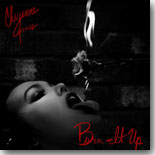 From the time she was ten years old, singer
Cheyenne James knew she wanted to be a
performer. In those days, she would sing songs
from Aretha Franklin, Billie Holiday, and Etta
James. Fifteen years later, the talented Texas
vocalist is working to make her own name in the
blues/R&B field, having earned the name “Lil’
Miss Blue-Eyed Soul.” She’s also a successful
stage actress, dancer, and as seen on the cover
of her recent debut, Burn It Up, a fire eater. From the time she was ten years old, singer
Cheyenne James knew she wanted to be a
performer. In those days, she would sing songs
from Aretha Franklin, Billie Holiday, and Etta
James. Fifteen years later, the talented Texas
vocalist is working to make her own name in the
blues/R&B field, having earned the name “Lil’
Miss Blue-Eyed Soul.” She’s also a successful
stage actress, dancer, and as seen on the cover
of her recent debut, Burn It Up, a fire eater.
Backed by a band (Rock Romano – bass, Dave
Carter and Mark May – guitars, Steve Krase –
harmonica, Randy Wall – keyboards, Jim Brady –
drums, Eric Demmer – sax, Lamar Boulet –
trumpet/flugelhorn) that matches her powerhouse
vocal, James absolutely rips through this set of
tunes, which features six originals, plus four
tasty covers.
The covers range from a house rocking take on
Titus Turner’s “Grits Ain’t Groceries,” to
Ashford and Simpson’s soulful “Let’s Go Get
Stoned,” to a folky read of Van Morrison’s
“Steal My Heart Away” and the brassy version of
Willie Dixon’s “You Know You Love Me Baby” that
closes the disc.
James’ originals are equally
potent. “Gypsy Mama” is a feisty shuffle, while
“I Didn’t Know” is a lively countrified blues,
and the slinky “Lay Me Down” is a funky R&B groover. “Rock” is a slow burning, seductive
blues ballad, the swinging “Roll Your Coal” is
greasy Memphis-styled soul-blues at its best,
and the moody ballad “What Does It Mean” blends
blues and jazz effectively.
James’ powerful vocals serve her well on this
well-crafted set. Carter and May’s guitar work
is standout, as is Krase on harmonica. The
rhythm section is rock-solid and the horns fill
in the gaps where needed. Burn It Up will
satisfy any fans of modern blues and soul,
alerting them to a new vocal dynamo on the scene.
--- Graham Clarke
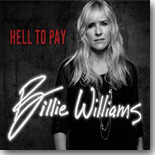 Boston native
Billie Williams has been a
professional singer since her teens, delving into blues, rock, soul, jazz, and country
over her career. Her self-titled debut received
a lot of attention in 2016, and she has followed
up with a worthy sophomore release, Hell To Pay,
re-enlisting Grammy-winning producer Danny Blume
and turning in another powerful set of
contemporary blues and roots music. Williams
wrote or co-wrote all 11 tracks, touching
on traditional blues topics and modern
experiences as well. Boston native
Billie Williams has been a
professional singer since her teens, delving into blues, rock, soul, jazz, and country
over her career. Her self-titled debut received
a lot of attention in 2016, and she has followed
up with a worthy sophomore release, Hell To Pay,
re-enlisting Grammy-winning producer Danny Blume
and turning in another powerful set of
contemporary blues and roots music. Williams
wrote or co-wrote all 11 tracks, touching
on traditional blues topics and modern
experiences as well.
The opener, “Damn,” is an intense, rumbling
blues rocker dealing with a break-up, and the
follow-up, “Cold November,” deals with the same
topic in a slightly more subdued but equally
passionate manner. “Start All Over” reflects on
the things that happen to send couples their
separate ways, and the exuberant soul/pop of
“You” picks up things a bit. The punchy title
track addresses the social/economic disparity
and the slow burner “Hour By Hour” is another
pointed look at the end of a relationship.
“Drink From My Cup” has a Crescent City feel,
thanks to Jeremy Mage’s keyboards and the funky
rhythm section work from Double Z (bass) and
Tony Allen (drums). The enchanting “Lost In The
Wilderness” sounds like a long-lost soul track
from the ’60s with the horns, Mage’s keyboards,
and the backing vocals, and “My Everything”
travels along that same vibe with a definite Stax
feel. The forlorn “Take These Wings” finds
Williams wistfully parting ways with a lover.
The anthemic closer, “Ten Million Sisters,”
was inspired by Williams’ participation in the
Women’s March in Washington back in 2017.
With her strong and soulful voice and
superlative songwriting skills, Billie Williams
is a voice that deserves to heard by blues and
roots fans, who are encouraged to give Hell To
Pay a spin as soon as they can.
--- Graham Clarke
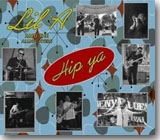 Lil A
and The Allnighters are a veteran West
Coast blues band based in Southern California,
but Hip Ya (Straight Up Blues) is only their
second release (their first being a demo
recording produced to generate gigs).
Singer/harmonica player Alex “Lil A” Woodson
stumbled onto the West Coast blues scene in the
early ’90s, during one of its most fertile
periods and fell in love with the soulful
harmonica sound generated by such luminaries as
William Clarke and Rod Piazza, who took the
young Woodson under his wing. The Allnighters
are guitarists Bill Bates, Geoff Gurrola, and
Mark Amparan, bassists Brion Munsey, and drummer
Johnny Minguez. Lil A
and The Allnighters are a veteran West
Coast blues band based in Southern California,
but Hip Ya (Straight Up Blues) is only their
second release (their first being a demo
recording produced to generate gigs).
Singer/harmonica player Alex “Lil A” Woodson
stumbled onto the West Coast blues scene in the
early ’90s, during one of its most fertile
periods and fell in love with the soulful
harmonica sound generated by such luminaries as
William Clarke and Rod Piazza, who took the
young Woodson under his wing. The Allnighters
are guitarists Bill Bates, Geoff Gurrola, and
Mark Amparan, bassists Brion Munsey, and drummer
Johnny Minguez.
Hip Ya consists of ten tracks, eight covers and
two originals penned by Woodson, one of which is
the smoking opener, “Poppin’ Corn,” on which
listeners will find out right away that Lil A’s
time spent learning from Piazza was well-spent.
Guest Kenny Huff plays electric bass on this
track. Next up is Junior Wells’ “Country Girl,”
covered faithfully to the original with
a fine vocal from Woodson and nice guitar work
from Bates and Gurrola, and a terrific take of
Little Walter’s “Too Late Brother.” Clarke’s
“Chromatic Jump” is a fine instrumental showcase
for Lil A’s harp, as is a raucous reading of
Slim Harpo’s “Hip Shake.”
The title track is the second Woodson original,
a cool West Coast-styled shuffle, followed by a
groovy cover of Darrell Nullisch’s “Love And
War,” which has a steamy Louisiana swamp blues
feel. The band stays in the Bayou State for a
soulful run at Earl King’s “Those Lonely Lonely
Nights.” They keep things in a soul bag for
Betty Everett’s “Ain’t Gonna Cry No More”
before wrapping things up with an exceptional
version of Clarke’s “Must Be Jelly.”
While folks in Southern California have been
listening to, and singing the praises of Lil A
and The Allnighters for over a decade, the
delightful Hip Ya should finally let the rest of
the country, and the world, know what they’ve
been missing.
--- Graham Clarke
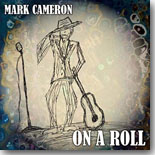 Minneapolis blues man
Mark Cameron returns with
his latest release, On A Roll (Cop Records), a
14-song set of original tunes from Cameron
(guitar, lead vocals), Rick Miller (harmonica,
vocals), Scott Lundberg (bass, vocals), Dan
Schroeder (drums), and Sheri Cameron (sax,
flute, percussion). This release is Cameron’s
sixth since beginning his focus on the blues in
2009, coming off of the excellent 2017 release
recorded live at Blues On The Chippewa, and he
and the band also recently represented Minnesota
at the International Blues Challenge. Minneapolis blues man
Mark Cameron returns with
his latest release, On A Roll (Cop Records), a
14-song set of original tunes from Cameron
(guitar, lead vocals), Rick Miller (harmonica,
vocals), Scott Lundberg (bass, vocals), Dan
Schroeder (drums), and Sheri Cameron (sax,
flute, percussion). This release is Cameron’s
sixth since beginning his focus on the blues in
2009, coming off of the excellent 2017 release
recorded live at Blues On The Chippewa, and he
and the band also recently represented Minnesota
at the International Blues Challenge.
The album kicks off with “Trouble Brewin’,” a
swinging shuffle that looks at the beginning of
the end of a relationship. “On Your Way To The
Top” adds a little funk to the mix, and “Dirty
Biscuit” is a gritty blues rocker about a
handful of a woman. “Ridin’ The Rails” is a road
song with a touch of Canned Heat. Sheri
Cameron’s flute accompaniment really adds to the
atmosphere. Meanwhile, the title track is an
amusing tune about a man who definitely is
feeling the blues, and “Dicey” is an interesting
jump blues driven by Sheri Cameron’s sax and
Mark Cameron’s rumbling spoken narrative.
“Next Stop Is The Blues” is a cool contemporary
blues with a touch of rock and pop that meshes
together well, and “Where I Got You From” goes
back in time to pre-war days with Cameron on
resonator, beginning with a dusty, throwback
recording approach before updating into more
modern times with the full band in support. The
spirited “Movin’ Out” gives a nod to Rosco
Gordon’s “Just A Little Bit,” and “Back Seat
Boogie” has a swinging old school rock n’ roll
feel, and the lively “Here We Go” keeps things
in the swing mode.
“What Lucy Says” is a terrific blues with
Cameron’s excellent guitar work front and
center. On the slinky “Mojo Shuffle,” Cameron
explains just what “mojo” is. On the closing
ballad, “Dreams,” Cameron turns in a soulful,
gospel-inflected vocal, perfectly complemented
by Ms. Cameron’s sax and Miller’s harmonica.
Cameron is a fine vocalist, guitarist, and
songwriter, and his bandmates provide superb
support throughout On A Roll, which is a most
impressive set of modern blues.
--- Graham Clarke
 Michele D’Amour & The Love Dealers have already
released one fine album this year, Heart of
Memphis, which is still enjoying success on the
blues and roots charts. Their follow-up,
Christmas In Blue (Blueskitty Records), may seem
like its right on the heels of its predecessor.
But D’Amour and the band have been working on it
for over two years, and well, it’s Christmas,
man, so what better time to release a Christmas
album, right? Michele D’Amour & The Love Dealers have already
released one fine album this year, Heart of
Memphis, which is still enjoying success on the
blues and roots charts. Their follow-up,
Christmas In Blue (Blueskitty Records), may seem
like its right on the heels of its predecessor.
But D’Amour and the band have been working on it
for over two years, and well, it’s Christmas,
man, so what better time to release a Christmas
album, right?
D’Amour wrote eight of the ten songs, and she’s
backed by her excellent ensemble, The Love
Dealers (Patrick McDaniel – bass, Jeff Cornell –
guitar, Dave Delzotto – drums, Brian Olendorf –
keys, and Noel Barnes – saxes) along with guests
CD Woodbury (guitars), Mike Mines (trumpet),
Greg Schroeder – trombone, and backing vocalist
Nancy Box. Mines and Schroeder join the rest of
the band for the rousing title track, which
opens the disc. Next is “Elf On A Shelf,” a
good-natured jab at the kids game that has crept
into the adult sector as well, the
appropriately-titled “Funky Santa,” and a cool
old-school ballad, “Bring My Baby Back.”
The jazzy “All I Got For Christmas” finds
D’Amour being passed over by Santa Claus while
the band really racked up, and on the spicy
“Naughty List” she tries to lure her fella
under the mistletoe. On the swinging
“Weatherman” she begs her favorite forecaster
(the track is dedicated to meteorologist Cliff
Mass) for snow at her Seattle home. “The
Noisiest Toy” is a wild rockabilly romp which
should remind listeners of their days as a kid
eagerly awaiting Christmas Day.
The two covers will be familiar to everyone.
D’Amour gives a lovely, reverential read of
“Silent Night,” and the band’s take on “Little
Drummer Boy” adopts a nifty Second Line shuffle
that closes the disc on a delightful note.
Christmas In Blue is an excellent
addition to any
blues fan’s holiday music collection.
---
Graham Clarke
|